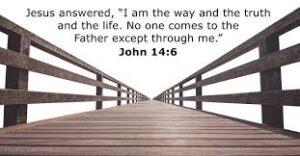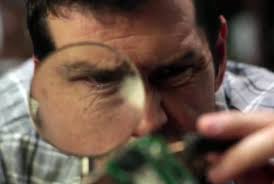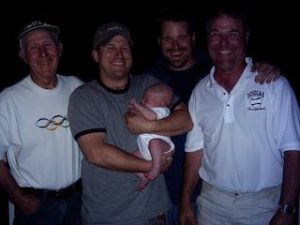“Protect, through the Holy Spirit who dwells in us, the treasure which has been entrusted to you.” 2 Timothy 1:14
As many of you know, I discovered a few years ago that I have blood sugar issues.  Well, to be more blunt, I am diabetic. The other morning for no apparent reason, my blood sugar shot up to what I consider an unacceptable level. As is my nature, I was not happy about the increase and I took immediate action. I jumped on my treadmill, increased the speed to an inappropriate level for a 73 year old and proceeded run the hills of my “workout “ room. Almost faster than it apparently went up it shot down. So fast in fact that I thought I was going to pull out my emergency Hershey bar to waylay its decline. Fortunately, it leveled off and it looks like all is “good.”
Well, to be more blunt, I am diabetic. The other morning for no apparent reason, my blood sugar shot up to what I consider an unacceptable level. As is my nature, I was not happy about the increase and I took immediate action. I jumped on my treadmill, increased the speed to an inappropriate level for a 73 year old and proceeded run the hills of my “workout “ room. Almost faster than it apparently went up it shot down. So fast in fact that I thought I was going to pull out my emergency Hershey bar to waylay its decline. Fortunately, it leveled off and it looks like all is “good.”
Since I jumped on the treadmill so fast, I didn’t have time to set up any video or audio or podcast to play during my workout. That just left me with my own thoughts.  As I was cruising along I thought about the urgency that drove me to the treadmill. First of all, I wear what is called a Continuous Glucose Monitor (CGM). That means that it is checking my blood sugar almost constantly. I only need to pull out my iPhone or read my watch to get a reading. It is a great tool. I can see what raises my sugar levels, lowers them, and keeps them balanced. Pretty cool technology.
As I was cruising along I thought about the urgency that drove me to the treadmill. First of all, I wear what is called a Continuous Glucose Monitor (CGM). That means that it is checking my blood sugar almost constantly. I only need to pull out my iPhone or read my watch to get a reading. It is a great tool. I can see what raises my sugar levels, lowers them, and keeps them balanced. Pretty cool technology.
Well, as I said earlier, I started thinking about the Glucose Monitor on my arm and how it related to spiritual things.  When I saw my numbers spike it alerted me that there was a problem. My doctor told me that I am a strange duck (no surprise to anyone who knows me), because I don’t show any symptoms of high or low blood sugar even in the middle of an “attack.” The only way I know if there is a problem is to check the numbers that my monitor has sent to my iPhone. Without that I probably would (and have) believed that all is good. We sometimes do the same thing spiritually. Ephesians 4:22-24 says, “Put off your old self, which belongs to your former manner of life and is corrupt through deceitful desires, and to be renewed in the spirit of your minds, and to put on the new self, created after the likeness of God in true righteousness and holiness.” This verse shows the safe zone we should strive for, but unless we have the Holy Spirit we will often think that “all is good” when it certainly isn’t.
When I saw my numbers spike it alerted me that there was a problem. My doctor told me that I am a strange duck (no surprise to anyone who knows me), because I don’t show any symptoms of high or low blood sugar even in the middle of an “attack.” The only way I know if there is a problem is to check the numbers that my monitor has sent to my iPhone. Without that I probably would (and have) believed that all is good. We sometimes do the same thing spiritually. Ephesians 4:22-24 says, “Put off your old self, which belongs to your former manner of life and is corrupt through deceitful desires, and to be renewed in the spirit of your minds, and to put on the new self, created after the likeness of God in true righteousness and holiness.” This verse shows the safe zone we should strive for, but unless we have the Holy Spirit we will often think that “all is good” when it certainly isn’t.
When we become believers, we are indwelled with a Continuous Monitor called the Holy Spirit. He is there constantly checking healthy and unhealthy levels for us. My monitor doesn’t change the levels for me, it just tells me where they are. The Holy Spirit is not a puppeteer that keeps me at a place of complete healthiness. He measures my thoughts, my actions, my words, my motives and all things that go into my relationships, into my day. My CGM is a tool that gives me power to make the kinds of changes I need to make for my health, but I had to do three things for it to be effective.
the Holy Spirit. He is there constantly checking healthy and unhealthy levels for us. My monitor doesn’t change the levels for me, it just tells me where they are. The Holy Spirit is not a puppeteer that keeps me at a place of complete healthiness. He measures my thoughts, my actions, my words, my motives and all things that go into my relationships, into my day. My CGM is a tool that gives me power to make the kinds of changes I need to make for my health, but I had to do three things for it to be effective.
 First of all, I have to put it on. John 14:17 says “Even the Spirit of truth, whom the world cannot receive, because it neither sees him nor knows him. You know him, for he dwells with you and will be in you.” We put on God’s monitor when we believe on Jesus as our savior. When we arrive at the place in our lives where we know that “He is the Way, the Truth, and and the Life, and no one will come to the Father but by Him,” God fills us with his spirit. He gives us a Continuous Good Decision Monitor. So, step one, put on the new man by receiving the gift the Holy Spirit that you might receive power.
First of all, I have to put it on. John 14:17 says “Even the Spirit of truth, whom the world cannot receive, because it neither sees him nor knows him. You know him, for he dwells with you and will be in you.” We put on God’s monitor when we believe on Jesus as our savior. When we arrive at the place in our lives where we know that “He is the Way, the Truth, and and the Life, and no one will come to the Father but by Him,” God fills us with his spirit. He gives us a Continuous Good Decision Monitor. So, step one, put on the new man by receiving the gift the Holy Spirit that you might receive power.
Secondly, I have to be in tune with my monitor. I have to check it often. I have to pay attention to what it says. I can’t go long stretches without consulting it. I have this wonderful tool to help keep me healthy, but I have to use it. It is easy enough, but I sometimes get caught up in the daily routine, or the hecticness of life, or maybe my own bad habits and ignore or refuse to “check things out.” In Ephesians 1:18 the Apostle Paul prays, “that the eyes of your heart may be enlightened, so that you will know what is the hope of His calling, what are the riches of the glory of His inheritance in the saints.”  The Holy Spirit enlightens us to the realization that God’s illumination manual is His Word. I trust that my CGM gives me valuable information and I can use that for my good. The Spirit gives me the understanding that God’s Word has valuable information that I can use for my good. The Spirit does not give me new information (revelation) outside the Word, but equips me to read the Word and to help me to recall the Word and to help me use the Word properly.
The Holy Spirit enlightens us to the realization that God’s illumination manual is His Word. I trust that my CGM gives me valuable information and I can use that for my good. The Spirit gives me the understanding that God’s Word has valuable information that I can use for my good. The Spirit does not give me new information (revelation) outside the Word, but equips me to read the Word and to help me to recall the Word and to help me use the Word properly.
Lastly, I need to use the information I am given. If I see my numbers are high and I go out and have an ice cream sundae, I am not using the information properly. If the Spirit gives me the power to read and understand the Word, I need to use the information properly. The Word reminds me how to live, how to speak, how to love others, how to have fulfilling relationships. If I choose an “ice cream sundae” instead, I will suffer the consequences. I have not been left alone. God has given me a comforter to help me maneuver this difficult life. He points me toward the Word and then gives me the power to understand and then apply it to my life. I don’t have to change the Holy Spirit every fourteen days like my CGM. I have Him forever. I can access Him any time to check my “numbers.” Then, instead of my iPhone I pick up my Bible, to see what my “levels” are. I felt an urgency this morning and it drove me to the treadmill. Nothing is more urgent than my relationship with Christ and my witness to my family and the world around me. If I allow, the Spirit will drive me urgently to the greatest health aid ever created…. God’s Word.
toward the Word and then gives me the power to understand and then apply it to my life. I don’t have to change the Holy Spirit every fourteen days like my CGM. I have Him forever. I can access Him any time to check my “numbers.” Then, instead of my iPhone I pick up my Bible, to see what my “levels” are. I felt an urgency this morning and it drove me to the treadmill. Nothing is more urgent than my relationship with Christ and my witness to my family and the world around me. If I allow, the Spirit will drive me urgently to the greatest health aid ever created…. God’s Word.




















 on chapter eighteen of my current one (been on chapter 18 for a long time now). I kid Elaine because she has started quite a few crocheting projects. Most of them remain the size of doilies. (maybe they are doilies, but I don’t think so). Sometimes people make bucket lists to try to do certain things they wish they had done earlier in their lives and often times they are things that they have always put off until tomorrow.
on chapter eighteen of my current one (been on chapter 18 for a long time now). I kid Elaine because she has started quite a few crocheting projects. Most of them remain the size of doilies. (maybe they are doilies, but I don’t think so). Sometimes people make bucket lists to try to do certain things they wish they had done earlier in their lives and often times they are things that they have always put off until tomorrow. our joy and peace with dread. Putting something off until tomorrow is like putting a piece of tape over the oil light on our dashboard- it doesn’t take away the problem, it just makes things worse in the long run.
our joy and peace with dread. Putting something off until tomorrow is like putting a piece of tape over the oil light on our dashboard- it doesn’t take away the problem, it just makes things worse in the long run. After a hearty dinner, Willis thanked his host. “I feel a lot better now, but I just know Pa is going to be real upset.”
After a hearty dinner, Willis thanked his host. “I feel a lot better now, but I just know Pa is going to be real upset.” now have it with you.” That is a pretty clear statement about procrastination. God doesn’t want us putting off doing good to others. When it comes to mind to call someone, send them a card, or visit them, we need to be quick to respond. Our timely response can make a world of difference in someone else’s life.
now have it with you.” That is a pretty clear statement about procrastination. God doesn’t want us putting off doing good to others. When it comes to mind to call someone, send them a card, or visit them, we need to be quick to respond. Our timely response can make a world of difference in someone else’s life. out for our benefit. I think this little poem illustrates most of our feelings.
out for our benefit. I think this little poem illustrates most of our feelings.